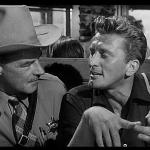
Source: Flickr user Geir Friestad
License
Life is filled with mundane, almost invisible negotiations. Some are external: who is going to take the dog out? Does this shirt look nice? What’s the timeline on getting this done? Who’s going to send the email? Did you remember to order the cat litter? If not, I will. Others, shaded, internal: did I leave the candle burning? When will I have time to pick up the dry cleaning? Am I busy that day? Do I want to tell them if the answer is “no”? It feels wrong to call these “boring.” They are the stuff of living, the majority of what we do each day. These conversations entertain us, distract us, even stimulate us. Without them, we’d sit and stare into the abyss of being. We’d be good without evil, food without salt.
On the other hand, these are superficially very boring to watch. The whole psycho-literary trick is getting people to care—themselves to be entertained, distracted, etc.—by what’s going on inside and between others. Takeshi Kitano’s Outrage trilogy (2010-2017) strikes a successful (which is to say engaging and uncomfortable) balance in this regard. These are Yakuza films. Violence strikes like a boxer—now suddenly, now with anticipation but always with strength and pain. A man, tied to a chair, is smashed to death by the pitching machine at a batting cage. Another has his mouth drilled wantonly at a dentist’s office (and he’s lucky enough to survive!). Still another gets blown up by a firecracker inside an S&M ball gag.
Most of the trilogy, however, deals in conversations, banal bits of dialogue between old men in garish suits and tacky sunglasses about would-be betrayals, failed deceptions, honor, and the good old days. This too entertains. America in 2024 but also Japan in 2017. Upon finishing the films, I couldn’t stop thinking about an old South Park (1997-Present) episode in which the boys become junior detectives, blasting with imaginary finger pistols at meth dealers and crooked cops. At the end, the last corrupt detective shoots his partner in a double-cross. He explains, as the trope goes, that he couldn’t trust someone else who was party to all his crimes. Then the twist: he remarks that the only one left he can’t trust is himself, turns the gun toward his head, and fires.
Ostensibly, our protagonist is Otomo (Takeshi Kitano), a lower-level Yakuza enforcer with his own squad. In reality, he’s intermittently in the three movies, showing up now and then amid a backdrop of constant boardroom meetings that try to prevent, but inevitably result in, wars between factions. It doesn’t hurt that he’s the only character who survives through the three films. Everyone else is disposable. They have personality quirks (one looks and dresses like Elvis in his portlier years; another fancies himself the Gordon Gecko of the Japanese underworld) but are otherwise indistinguishable, a long parade of sub-stereotypes, graying or gray men who distinguish themselves by their ability (and often failure) to lie well.
For all the violence, the Outrage trilogy is mostly composed of talking, of tit-for-tar arguments and jokes at the expensive of the self-serious yakuza. An underling complains about the lack of lunch at an all-hands meeting. A boss explodes at his foot soldiers and their Kansai accents. Saggy old men hold mouths wide open in disgust at being (from the audience’s perspective) so obviously and easily outmaneuvered that it cannot help but bring a smile to the viewer’s face. These men are pathetic. They consider, discuss, slip up, and fail just like we do.
The easy opinion to draw out of the trilogy’s marrow is that the yakuza, business people, and the cops are all one thing, all operate through backstabbing, double-dealing, and corruption. They meet in little white-painted rooms powdered with ferns, dotted with faux-leather (or real) couches and chairs with big, brass tacking. This observation is, of course, true. But what keeps dogging my thoughts is the banality of it all, the way these films capture life in its most basic form: talking, thinking, failing. The trilogy is Curb Your Enthusiasm (2000-Present) for mafiosi, which is another way of saying that it boils life down to its engrossing, tedious essentials.













